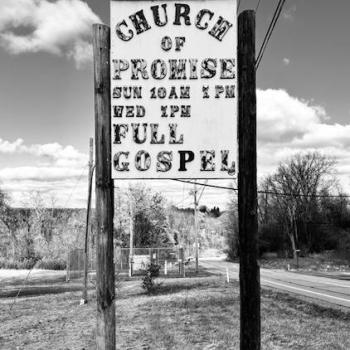It is Easter Monday, a day many traditions take off in addition to Easter as a final day of celebration. But on that first Monday, those who were there at the birth of this uprising and miracle that would become the church were swimming in confusion.
There were different stories — two travelers from Emmaus said they saw him alive; some women who went to care for the corpse (women's work) came back with wild stories of an empty grave and a resurrected Jesus going ahead to Galilee. In the days ahead, a Jesus who was almost always not recognized would pass through doors and walls, cook fish on a beach, place the hands of the unbelieving in his wounds. It was the classic rumor and denial that follow on the heels of great tragedy. The cohort was stunned and shattered, hiding and terrified. It was great chaos and incredible loss. No one could make sense of the fragmented stories and appearances.
Only much later in the arc of the story do we see Jesus' followers grasp a sense of who they were now to be in the world. Forty days later, at the Jewish festival of first fruits, called Pentecost, the script reverses. A powerful, otherworldly flame of Spirit sweeps into the room where they are gathered (they are always hiding, inside….) and then the disciples pour out into the streets, preaching. They become resurrection people, and the church is born. These are some of the stories in Scripture that most churches will lead us through in the next few weeks.
This has me thinking two things. First, resurrection people must tap immense courage. Second, you can't be a resurrection person without fully embracing death.
And this, perhaps, is where much of our church teaching fails us. Like a lot of us, I grew up much more comfortable with teachings of Jesus giving me victory; of God having a vast design in which any failures were actually just victories in which I did not fully grasp God's moving. It was akin to blasphemy to suggest that God was not in charge of every death and wrong move.
But lately I have been thinking that we can't be a resurrection people unless we go through death — see it, feel it, and let it in. In fact, a lot of my spiritual work for the last ten years has been discovering how death, in all its ugly ways, can make us more authentic, powerful resurrection people in the world. Because people who are no longer afraid of death are very powerful people indeed; people to be feared by those in charge.
Think of it, what is possible if we do not fear death? As the scriptural stories unfold, we will see this enfleshed in the lives (and the manner of death) of those followers of Jesus. They did die. Some brutally. But they confounded all of Rome's power by not fearing death.
My work in the last few years has been focused around a companion resurrection story in Scripture (yes, there are, in fact four or five other stories of resurrection in the Bible other than the big one). For instance, in 2 Kings 4 we read of a woman who builds a holy room for the prophet Elisha to rest in. He promises her a gift in response — a son. Twelve years later, the son dies, and she lays his body in the holy room and goes to fetch Elisha.
There are some beautiful turns in the story, with powerful applications to our spiritual journeys, and I explore them further in my book, The Soulmaking Room, published by Upper Room Books and an April book selection of the Patheos Book Club. Suffice it to say that before the child is resurrected, Elisha, the holy man who had asked for a double portion of his mentor Elijah's power, has to work hard to bring this child back. He tries three different things. The final step is to lay himself out on the child's body. Scripture tells us that he does this "eye to eye, mouth to mouth." It is powerfully, creepily intimate.
The story is in Scripture because he succeeds, but the hidden narrative is how closely he comes to failure. This is important, because this is much more true to our human experience — not the grand, triumphant successful gesture, but the stumbling persistence and the experience of failure. As a long follower of Jesus, I know this failure, and I want to be as honest and bold as this woman is in this text. I want to talk back with God, ask God why the gifts God put in my path die, and find spiritual understandings that include failures, with all their hidden powers and gifts.
I believe part of the power of the early church and its witness was due to it being a group of people who took in failure and death. They accepted that they would likely be tortured and die like Jesus did.
How do we borrow this harsh teaching for our day? What should we die to? What should we die for?
We do not live in the age of harsh Roman occupation — or do we? Many of us would argue that we live inside Rome, colonizer of the known world, importing clothes from Pakistan and China, raw materials from the continent of Africa, oil from the fomenting Middle East and immense tracts of the only remaining natural frontiers, cheap sugar from the poorest island in the world, Haiti and the Dominican Republic. How do we live lives of love — both public and private — within this context of global poverty, illness, and exploitation? How do we honor our brothers and sisters globally and well as in our households?




